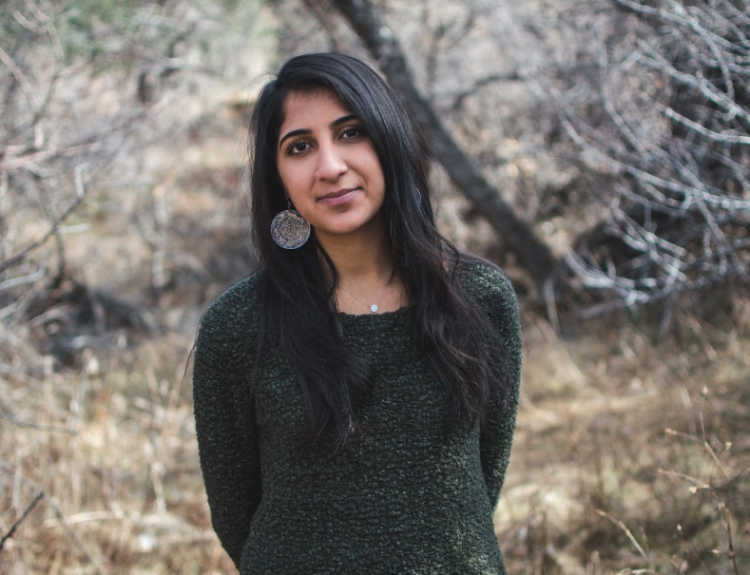Outstanding grad examines ‘the enemies of conservation’
Collaboration between social scientists and wildlife conservationists is key to preserving the environment and protecting human rights, she concludes
In rural Africa and worldwide, “conservation first” and “people first” initiatives often clash, but Rashel Gandhi-Besbes contends that people are part of the environmental equation and that a host of experts should collaborate to help not only the environment but also the local people who depend on it.
That is the focus of Gandhi-Besbes’s honors thesis and one reason she has been named the outstanding graduate of the College of Arts and Sciences for fall 2018. She is graduating summa cum laudein anthropology from the University of Colorado Boulder.

Rashel Gandhi-Besbes wrote her honors thesis about the balance between human interests and wildlife interests in Tanzania. Photo by Omar Kaheel. At the top of the page, giraffes stand near a road in Serengeti National Park in Tanzania. iStockphoto.
Her thesis is titled “The Enemies of Conservation: Balancing Humans and Wildlife Within and Surrounding Protected Areas in Tanzania.”
Gandhi-Besbes launched her research after talking with her advisor, anthropology Professor J. Terrence McCabe, about why conservation efforts are failing. “He helped me turn a deep concern for the planet and all its species into a practical research question,” she told fellow Honors Program graduates.
Her thesis focuses on Tanzania, which McCabe has studied extensively. In that country, indigenous people often view conservationists as barriers to their well-being, and conservationists can view local people as threats to the environment.
That divide is worsened by the fact that experts in the fields of wildlife conservation and social science tend not to exchange ideas, she wrote in her thesis: “Social scientists do not study wildlife, and wildlife conservationists do not know people. (Academic) literature focuses on ecology or human cultures.”
She concludes that “collaboration between wildlife conservationists and social scientists is the first step to creating a conservation system where wildlife preservation is successful while basic human rights are protected.”
In his written summary of Gandhi-Besbes’ honors thesis, McCabe noted that her committee was impressed with her academic rigor, insightfulness and articulate writing and that the committee unanimously recommended her for the highest academic honor, summa cum laude.
Attaining this distinction was neither easy nor assured, she said. “At one point, I had someone tell me I should give up.”
She did not give up. “I became driven by a cause rather than a goal,” she said, adding. “I was inspired by the idea that something I wrote could contribute to the conservation of wildlife, to the preservation of landscapes, to the well-being of humans, and hopefully, to the regeneration of the planet.”
Like many high achievers, Gandhi-Besbes admits to struggling with imposter syndrome. Scientific American defines the condition as a pervasive feeling of self-doubt or insecurity “despite overwhelming evidence to the contrary.”
I was inspired by the idea that something I wrote could contribute to the conservation of wildlife, to the preservation of landscapes, to the well-being of humans, and hopefully, to the regeneration of the planet.”
In a recent conversation with James W.C. White, interim dean of the College of Arts and Sciences, the outstanding graduate and the college leader swapped stories about grappling with imposter syndrome.
Fortunately, the condition hasn’t stopped either from tackling big projects. Gandhi-Besbes plans to take a year off before going to law school. She is thinking about starting a nonprofit group that would teach kids about conservation and how humans fit into the picture.
She is also thinking about studying law at Columbia University in New York, in the United Kingdom or in Canada, where she is from.
In her prepared remarks to fellow honors graduates, Gandhi-Besbes said that being in the College of Arts and Sciences “has taught us how to tell a story and to challenge others to do the same.’
She also urged her fellow graduates not to abandon hope: “Sure, our government is basically failing, climate change is occurring at the fastest rate in modern history, and everyone is feeling a common sense of existential dread,” she said, adding:
“The world is giving us one of the biggest chances in history to make a difference. Change is coming, and we’re at the frontlines. So what I want to leave you with today is to remember the importance of passion. To remember the importance of collaboration. And to remember your influence on the world around you.”

